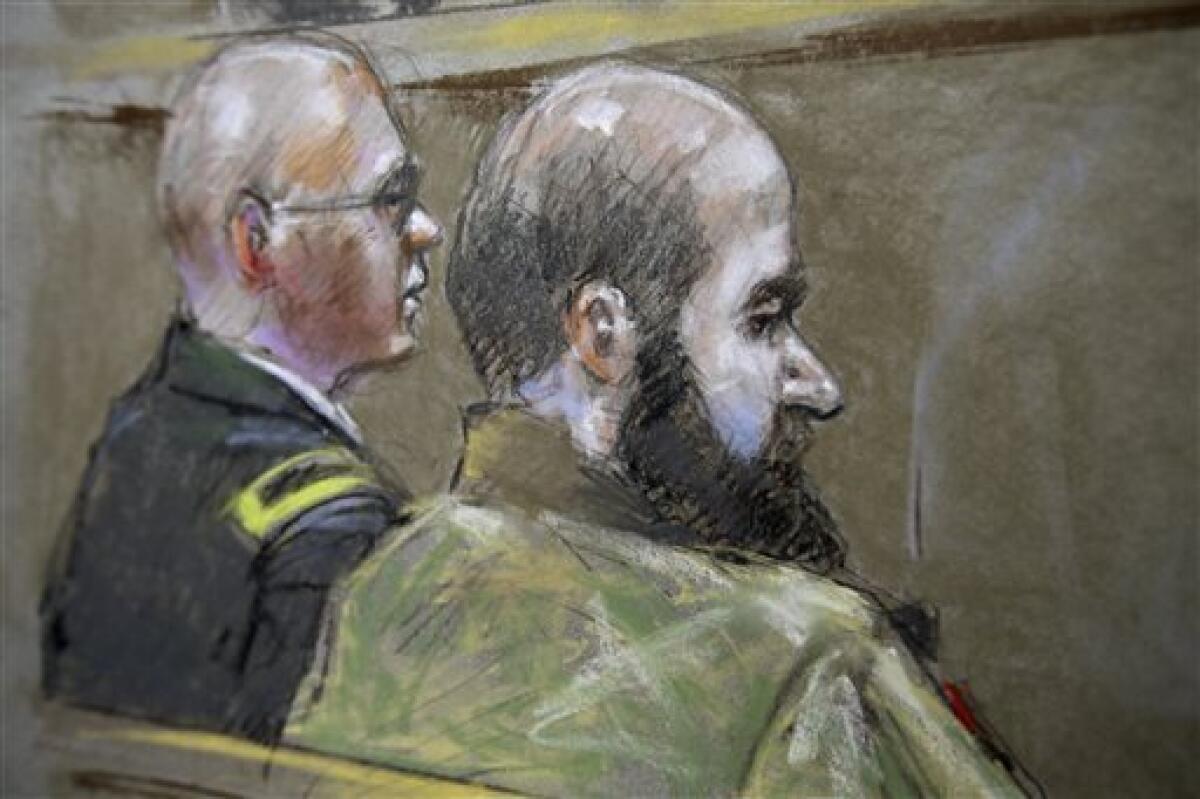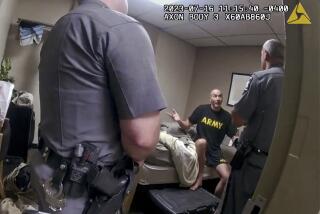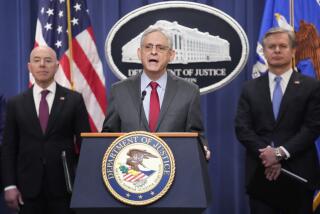Ft. Hood shooter’s documents show accolades, allege ‘war crimes’

FT. HOOD, Texas—A few days before he gunned down fellow soldiers at this central Texas Army base four years ago, Maj. Nidal Malik Hasan sent an email to superiors about something that had been troubling him: suspected war crimes.
And one day before the rampage, the Army psychiatrist had received a glowing evaluation from superiors who recommended him for promotion and future assignments as chief of psychiatry or commander of a combat stress team.
In one of Hasan’s emails, he wrote that soldiers had shared with him disturbing accounts of troops contaminating the Iraqi water supply, of medics killing an injured insurgent and a soldier killing a female bystander.
“I’m still not clear on the exact guidelines of when and what to report,” Hasan wrote in one of the emails, supplied to The Times by Hasan’s civil attorney, John Galligan.
“I think I need a lot of reassurance for the first few times I come across these,” the email said.
The email was dated Nov. 2, 2009. Three days later, Hasan walked into a medical processing center at the base and shot scores of soldiers, killing 13 and wounding more than 30.
Hasan is charged with 13 counts of premeditated murder and 32 counts of attempted premeditated murder. He has been representing himself at trial, and he rested his case Wednesday, a day after prosecutors finished.
Prosecutors called nearly 90 witnesses and presented more than 700 pieces of evidence. Hasan rarely cross-examined witnesses or objected, speeding proceedings that have lasted about two weeks instead of more than a month, as the judge had expected. He presented no witnesses of his own, but did introduce one piece of evidence: his glowing evaluation.
Prosecutors had argued that Hasan, an American-born Muslim, was motivated by radical religious beliefs to target soldiers that day, shouting “Allahu akbar” -- Arabic for “God is great” -- before opening fire.
Hasan grew a beard before trial and refused to shave, in violation of Army regulations, citing his religious beliefs. He admitted to the shooting at trial, but said he attacked soldiers to protect Taliban leaders overseas.
“War is an ugly thing,” he declared in his opening statement, noting that evidence would show he “was on the wrong side, that I then switched sides.”
The military judge rejected Hasan’s “defense of others” legal strategy and barred him from using it. As the trial started, Hasan tried to discuss the emails while cross-examining one of the supervisors who received them, Lt. Col. Ben Phillips.
Hasan began by questioning Phillips about the last officer evaluation report he and another supervisor completed on Nov. 4, 2009.
The report was supplied to The Times this week by Galligan. It contains laudatory evaluations of Hasan’s work and recommends him for promotion and high-ranking future positions such as chief of psychiatry.
In the four months Hasan had been assigned to Ft. Hood’s Carl R. Darnall Army Medical Center, the evaluation said, his “strong work ethic, professionalism, sound judgment and willingness to take on various responsibilities and tasks have been critical in the overall delivery of behavioral healthcare.”
According to the evaluation, Hasan reduced wait times for soldiers’ medical evaluations, streamlined psychiatric evaluations, helped with drug treatment and filled in as chief of inpatient psychiatry. It said Hasan had “unlimited potential for advancement and leadership” and should be “groomed for those roles.”
“Maj. Hasan is an outstanding physician who has the potential to excel,” the evaluation concluded, “promote now.”
Hasan questioned Phillips on the stand about the evaluation, noting that he had received the highest of four ratings: “outstanding performance, must promote.” Phillips said that was routine “with any officer unless I wanted to end their career.”
Hasan noted that he was also rated “best qualified.”
“Because if you check off any other, it’s basically the end of that officer’s career,” Phillips said, downplaying the positive recommendation.
Finally, Hasan raised the issue of the emails. A prosecutor interrupted, objecting to the questions.
“Your honor, it goes to motive,” Hasan said.
The judge disagreed, and Hasan never raised the issue again.
In his emails, Hasan had asked Army supervisors and legal staff for advice on how to handle three disturbing accounts he had heard from soldiers.
One soldier told him fellow troops had poured 50 gallons of fuel into the Iraqi water supply “as revenge.” Another told him about medics killing a severely injured insurgent, (a potential “mercy killing,” Hasan speculated). A third described killing an Iraqi woman because “he was ordered to kill anything that approached.”
Hasan had mentioned the Iraqi water supply incident in another email on Oct. 23, 2009, noting that he had shared the story with an Army legal consultant and was told it was “a war crime.” Hasan said he pursued the matter with other officials but could not get an answer.
Hasan signed the email with a quote from the Koran — “All praises and thanks go to Allah, the Cherisher and Sustainer of all the worlds.”
A Ft. Hood spokesman referred questions about the emails to an Army spokesman, who could not be reached late Wednesday.
Galligan, a former military judge, said the emails should have been a red flag for Army officials.
“What they show is an individual who is expressing some deep-seated concerns about war crimes and the mistreatment of people in the Muslim world,” Galligan said, “What it says to me, and I know Nidal, is this is a man who was going through some intense internal struggles.”
The emails are only the latest in a string of documents Hasan has released to the media that provide insight into his mind-set before the shooting.
In a recent letter to the Killeen Daily Herald, which covers the Ft. Hood area, Hasan said he “was defending my religion” in the attack.
According to documents Hasan released to the New York Times, he told a military mental health panel that evaluated him a year after the shooting that what he did wasn’t wrong because “it was for the greater cause of helping my Muslim brothers.”
On Wednesday, Hasan told the judge he did not act “under the heat of sudden passion, but I would say there was adequate provocation—that we were deploying soldiers that were going to engage in an illegal war.”
Hasan’s case has been winding down, with closing arguments expected Thursday. Galligan said he didn’t expect Hasan to say much, since the judge has made it clear he cannot develop his “defense of others” argument. Galligan said he was frustrated that Hasan had not been able to present the emails and other evidence to bolster his claims.
“When he talked about illegal wars—these are deeply held beliefs,” Galligan said. Those beliefs, he said, speak to Hasan’s motive as much as evidence the judge allowed prosecutors to present from Hasan’s computer, including Internet searches and Web pages he visited shortly before the shooting that concerned the Taliban and jihad, or holy war.
“These are just as relevant as any of his Internet searches,” Galligan said of the emails, “It’s evidence of a person having an intense internal debate about these wars.”
ALSO:
Ft. Hood shooter rests defense; doesn’t testify or call witnesses
Vegas carjacking: Bodies of CHP officer, brother-in-law heading home
WikiLeaks trial: Bradley Manning shows no reaction to prison sentence
More to Read
Start your day right
Sign up for Essential California for news, features and recommendations from the L.A. Times and beyond in your inbox six days a week.
You may occasionally receive promotional content from the Los Angeles Times.







